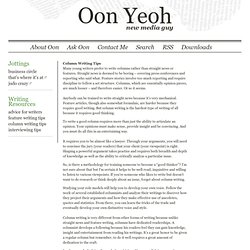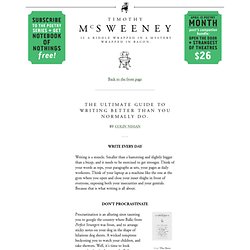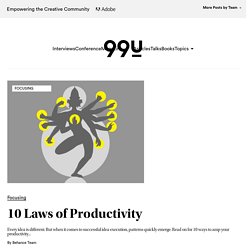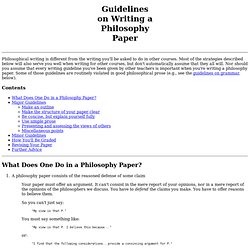

105 Tips from Professional Writers. Column Writing Tips. Column Writing Tips Many young writers prefer to write columns rather than straight news or features.

Straight news is deemed to be boring – covering press conferences and reporting who said what. Feature stories involve too much reporting and require discipline to follow a set structure. Columns, which are essentially opinion pieces, are much looser – and therefore easier. Or so it seems. Anybody can be trained to write straight news because it’s very mechanical. How to Write a 20 Page Research Paper in Under a Day. Posted on: 10 Cado 7:0 - 5.27.29 So you've procrastinated again.

You told yourself you wouldn't do this 2 months ago when your professor assigned you this. But you procrastinated anyway. Shame on you. It's due in a few hours. Pick a Topic The more "legally-oriented" your topic is, the better. 201 Ways to Arouse Your Creativity. Arouse your creativity Electric flesh-arrows … traversing the body.

A rainbow of color strikes the eyelids. A foam of music falls over the ears. It is the gong of the orgasm. ~ Anais Nin. 33 Ways To Stay Creative. The Ultimate Guide to Writing Better Than You Normally Do. Writing is a muscle.

Smaller than a hamstring and slightly bigger than a bicep, and it needs to be exercised to get stronger. Think of your words as reps, your paragraphs as sets, your pages as daily workouts. Think of your laptop as a machine like the one at the gym where you open and close your inner thighs in front of everyone, exposing both your insecurities and your genitals. Because that is what writing is all about. Procrastination is an alluring siren taunting you to google the country where Balki from Perfect Strangers was from, and to arrange sticky notes on your dog in the shape of hilarious dog shorts.
The blank white page. Mark Twain once said, “Show, don’t tell.” Finding a really good muse these days isn’t easy, so plan on going through quite a few before landing on a winner. There are two things more difficult than writing. It’s no secret that great writers are great readers, and that if you can’t read, your writing will often suffer. Do Something Productive with Your Life. List of Journal Ideas. 10 Laws of Productivity.
You might think that creatives as diverse as Internet entrepreneur Jack Dorsey, industrial design firm Studio 7.5, and bestselling Japanese novelist Haruki Murakami would have little in common.

In fact, the tenets that guide how they – and exceptionally productive creatives across the board – make ideas happen are incredibly similar. Here are 10 laws of productivity we’ve consistently observed among serial idea executors: 1. Break the seal of hesitation. A bias toward action is the most common trait we’ve found across the hundreds of creative professionals and entrepreneurs we’ve interviewed. 2. When our ideas are still in our head, we tend to think big, blue sky concepts. 3. Trial and error is an essential part of any creative’s life. To avoid ‘blue sky paralysis,’ pare your idea down to a small, immediately executable concept. 4. When working on in-depth projects, we generate lots of new ideas along the way. Guidelines on Writing a Philosophy Paper. Use simple prose Don't shoot for literary elegance.

Use simple, straightforward prose. Keep your sentences and paragraphs short. Use familiar words. We'll make fun of you if you use big words where simple words will do. If your paper sounds as if it were written a third-grade audience, then you've probably achieved the right sort of clarity. It's OK to show a draft of your paper to your friends and get their comments and advice. Read your paper out loud. "Does this really make sense? " Presenting and assessing the views of others. 9 (Arbitrary) Ways to Get Your Writing Rejected. When novelist Helen Simonson ( Major Pettigrew's Last Stand) was asked to help winnow entries for short story contests and literary journals, it was her turn to switch from seeking approval to giving it out.
Sparingly. As she puts it: Having spent many years putting hours of effort and creativity into my own work -- sending off brown envelopes filled with still-warm pages, to various editors and judges -- it is rather horrifying to discover that it takes me about a minute to know that yet another manuscript is about to be "binned" as they say. In a sort of apology, I feel the least I can do is to reveal a few of the instant signs that your writing genius will not be discovered by the judges this time around! What follows is a few of Simonson's deal-killers, from her only somewhat tongue-in-cheek article "Ten ways to get your writing rejected' : And here are a few of my own additions to the "get rejected fast" list: Copyright (c) 2010 by Susan K.